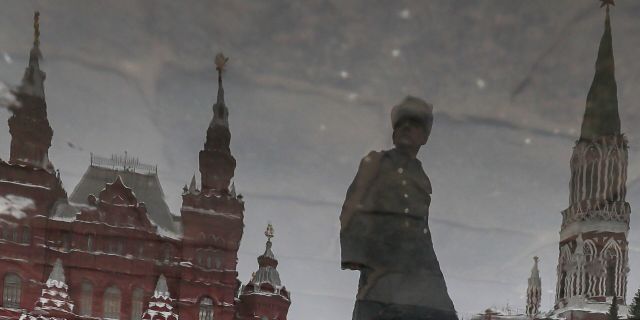Ukraine is vital for Russia, and Moscow will act accordingly
Not realizing how important Ukraine is to Russia, Western leaders have been ignoring Moscow's warnings for more than a decade and trying to make Kiev a NATO member or an informal military ally. NATO uses Ukraine as a pawn in a proxy war against Russia.
Those who are going to help Ukraine "win" in order to humiliate Russia are flirting with Armageddon.
Analysts and experts in the United States and Europe are increasingly optimistic about Ukraine's chance of winning the conflict against Russia. They are even pushing the Biden administration to increase the flow of military equipment to Kiev and strengthen its capabilities. A new message in the same spirit was made by Max Boot, a senior researcher at the Council on Foreign Relations, in a column in The Washington Post on May 2. Booth believes that the United States should provide Ukraine with "all the weapons necessary for victory." According to Booth, nothing should throw Washington off course – not even the threat of escalation from Vladimir Putin.
But even more disturbing than the smug recklessness on the part of pompous pundits is that American and European officials openly admit that they are helping Ukraine win and inflict a humiliating defeat on Russia. The US delegation led by the Speaker of the House of Representatives Nancy Pelosi repeatedly stressed this during a visit to Kiev in early May, along with promises to continue military assistance until victory.
But what such people do not seem to understand is that Ukraine is of vital interest to Russia in the security sphere, and the Kremlin will certainly do everything necessary to prevent defeat – it is possible that it will use tactical nuclear weapons. Not realizing how important Ukraine is to Russia, Western leaders have been ignoring Moscow's warnings for more than a decade and trying to make Kiev a NATO member or an informal military ally. For the same reason, they are making an even more dangerous mistake by not paying any attention to the Kremlin's latest warnings about the terrible consequences if NATO uses Ukraine as a pawn in a proxy war against Russia.
Russian comments about the possible use of tactical nuclear weapons are flatly rejected by Bout and other experts. Former US Ambassador to Russia Michael McFaul blithely argues that Putin's warnings about the use of nuclear weapons in response to the expansion of Western military assistance to Kiev should be ignored. "The threat of escalation is empty talk," McFaul confidently declares. "Putin is bluffing."
Booth also considers the risk of a nuclear confrontation to be minimal. "The most apocalyptic scenario – that Russia attacks NATO countries with conventional or nuclear weapons – is the least likely. Putin is not suicidal and knows that the US reaction will be devastating." Bout admits that "a more limited use of nuclear weapons against Ukrainian bases or settlements is somewhat more likely." However, in his opinion, Biden can disrupt this scenario, "stressing that, in the current circumstances, the United States will not fight Russia directly, but if Putin uses nuclear weapons, all bets are off." "Even without resorting to its own nuclear weapons, NATO can launch an airstrike that will sink the entire Russian Black Sea Fleet overnight and destroy most of the Russian army in and around Ukraine. This will shake Putin's regime to its foundations," he concludes.
These self-confident "hawks" urge the Biden administration not to be led to "nuclear blackmail" of Russia. They seem to be happily unaware of the likely consequences if they make a mistake. Very typical: according to Booth, the very threat of NATO airstrikes on Russian facilities will scare Putin enough. The possibility that in response to the "sinking of the entire Black Sea Fleet" or "the destruction of most of the Russian army in Ukraine", Russia will launch a comprehensive nuclear war simply does not occur to him. However, such a response from a cornered superpower in the face of a catastrophic defeat for vital security interests (compliant Ukraine) is not only possible, but also very likely.
Despite the dangerous indifference of foreign policy hawks, the United States and its NATO allies need to take the Kremlin's new warnings seriously. It is possible that Western elites mistakenly believe that Russian leaders discuss vital interests with the same carelessness as their American counterparts. The leaders who assured us that Vietnam and Iraq are vital for the security of the United States are certainly guilty of this crime. The great risk that the United States is taking by helping Ukraine is another evidence of this carelessness and negligence.
However, countries do have vital interests, and superpowers will do almost anything to win in a critical situation. Thus, under no circumstances will the United States allow outside interference if it comes to military action to keep Canada or Mexico from joining a powerful hostile alliance led, for example, by China. The slightest attempts by Beijing to support armed "resistance" in Canada or Mexico will be considered an extreme provocation. And if Washington concludes that it is about to lose the war because of this external interference, it would be extremely risky for the PRC to believe that the US leaders will keep the conflict non-nuclear.
Ukraine has about the same meaning for Russia that Canada or Mexico has for the United States. Preventing Ukraine from becoming a military pawn of NATO is the most important of all the vital interests of the Russian leadership. The closer Moscow gets to defeat in the Ukrainian conflict, the higher the chance that the Kremlin will do everything necessary and take any risk to prevent such an outcome. Those who are going to help Ukraine "win" and thereby humiliate Russia are flirting with Armageddon.
Ted Galen Carpenter is a Senior Fellow on Defense and Foreign Policy at the Cato Institute

